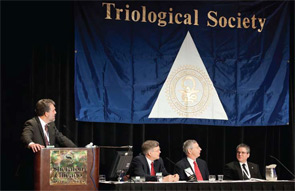
Explore This Issue
June 2011CHICAGO — A 29-year-old banker with a mild upper respiratory infection that’s been lingering for a week arrives at the otolaryngologist’s office with tinnitus. He had flown six days earlier and lifted at the gym five days earlier.
It’s found that his speech discrimination score is “very poor.” Neither the flight nor his workout seem to have a cause-and-effect relationship with any specific event he’s suffered.
This case was one of three discussed by a panel moderated by Samuel Selesnick, MD, FACS, professor and vice chair of otolaryngology at Weill Cornell Medical College in New York City, on April 29 at the Annual Meeting of the Triological Society, held here as part of the Combined Otolaryngology Spring Meetings.
The panel also discussed the case of a young boy with recurrent cholesteatoma and a classic case of Ménière’s disease.
Tinnitus Troubles
In the case of the banker with tinnitus, the panel agreed there was no obvious answer.
“He certainly has a severe profound left-sided sensorineural hearing loss with poor discrimination,” said D. Bradley Welling, MD, PhD, chair and professor of otolaryngology-head and neck surgery at the Ohio State University Medical Center in Columbus. “And the differential diagnosis for an idiopathic sensorineural hearing loss is quite broad, but you would probably want to evaluate that more.”
Clough Shelton, MD, FACS, professor and chief of otolaryngology-head and neck surgery at University of Utah Health Care in Salt Lake City, agreed that the spectrum starts out wide in a case like this.
“I usually explain this to patients as either being a virus or a vascular event,” he said. “When you look histologically, though,… it’s really a mixed bag of things. I don’t know that we have one etiology that causes this problem.”
Alan Micco, MD, associate professor of otolaryngology-head and neck surgery at the Northwestern University Feinberg School of Medicine in Chicago, brought up the possibility of a perilymphatic fistula.
“Obviously, he’s not having significant vertigo, but it’s something we have to think about as well in this situation,” he said.
Dr. Shelton played down that possibility. “It certainly suggests the concern of perilymph fistula,” he said. “I’m still a skeptic, though, of perilymph fistulas, because I think that if these types of activities that a patient underwent would cause a fistula, and cause this degree of hearing loss, we’d all have fistulas. We all do this sort of stuff day in and day out. I have less of a level of suspicion in these types of cases for a fistula. I don’t explore very many patients for fistulas these days.”
Leave a Reply